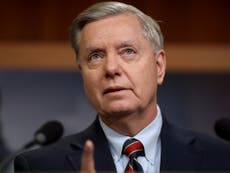Trump leaves his Kurdish allies utterly betrayed by a shady deal with a desperate Erdogan
The Turkish president has agreed to be the prison guard for northern Syria in return for some political gains for his own domestic survival
It is no secret that Turkey has been planning a large scale military operation to create a “safe zone” in northern Syria for a long time. However, it now seems to have received the necessary green light from President Trump.
This decision will have a number of serious ramifications on the power balances and security environment in the region, but there is one party that will feel disillusioned and deeply betrayed. The Kurds.
It is not yet clear what the scale of such a Turkish military incursion will be or how far it would go into the Syrian territory controlled by the Kurdish led Syrian Democratic Forces (SDF). It is expected to remain within a 100km stretch along the Turkish-Syrian border.
However, after a phone call between Trump and President Erdogan at the weekend, the White House said that the US “will not support or be involved in the operation, and United States forces, having defeated the Isis territorial ‘Caliphate’, will no longer be in the immediate areas.”
In other words, the Turkish military operation could be a lot more than an incursion and turn into a full scale invasion, probably much deeper than the expected 100 km stretch, and it seems that the US will do nothing about it.
For Erdogan, there are a number of drivers for such a military intervention. Most important is that this could be a political life saver for him as he faces an increasingly challenging domestic political environment.
Some of Erdogan’s old political allies – such as Abdullah Gul, Ahmet Davutoglu and Ali Babacan – are all in the process of establishing their own political parties. In fact, Erdogan’s AK Party is still badly wounded after losing the June Istanbul mayoral election to Ekrem Imamoglu who continues to increase his political popularity throughout the country. On top of all these political worries, the economy is not doing well either.
However, the presence of nearly 4 million Syrian refugees in the country will be the most significant deciding issue for the electorate in the country, and Erdogan needs to find a face-saving way to start sending them back home if he wants a boost his chances of re-election.
For Trump, the driver seems to be costs, as he wants to have nothing to do with the 12,000 captured Isis fighters, 4,000 of whom are foreign nationals. In short, the US government is disappointed with the refusal of European states to take their own Isis fighters back, and as pointed out by the White House statement, “The United States will not hold them for what could be many years and great cost to the United States taxpayer.”
So, with this new agreement over Turkey’s forthcoming military intervention, “Turkey will now be responsible for all Isis fighters in the areas captured over the past two years…”
In other words, Erdogan has agreed to be the prison guard for northern Syria in return for some political gains for his own domestic survival.
Only back in January, Trump threatened to “devastate Turkey economically”, if it carried out a military operation against the Kurds in northern Syria. And so it is not surprising that they have greeted this news with total disbelief.
An alliance with the Syrian regime might now be the only realistic option for them to continue with their political aspirations, as Turkey considers the SDF an extension of the banned Kurdistan Workers’ Party (PKK), which has waged a bloody conflict for a Kurdish autonomy in Turkey for nearly four decades. Turkey is likely to hit hard the SDF’s militia – the YPG – in its forthcoming military intervention.
The Kurds will also struggle to secure the support of the Assad regime, especially considering that a strong alliance has recently been developed between Turkey, Russia and Iran over the future of Syria.
The Kurds’ feelings of betrayal are real, and they have been left between a rock and hard place. Trump’s pursuit of short-term expediency might well change forever the Kurds’ narratives on who to trust and how to survive in the Middle East.
Alpaslan Ozerdem is Dean of the School for Conflict Analysis & Resolution and professor of peace and conflict studies at George Mason University.





Join our commenting forum
Join thought-provoking conversations, follow other Independent readers and see their replies